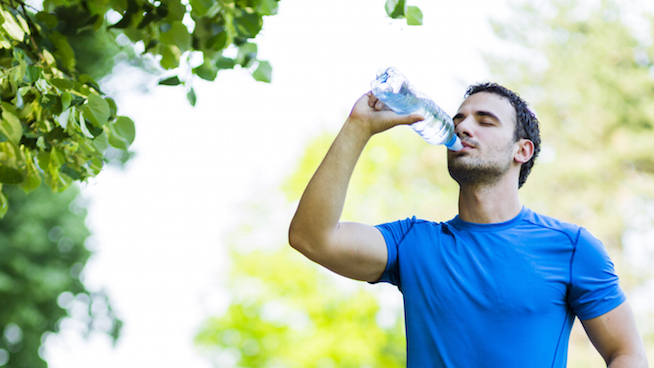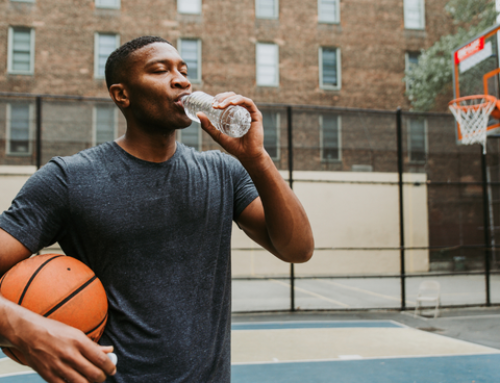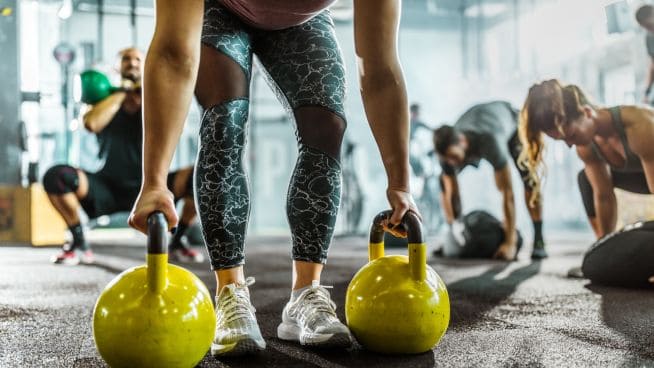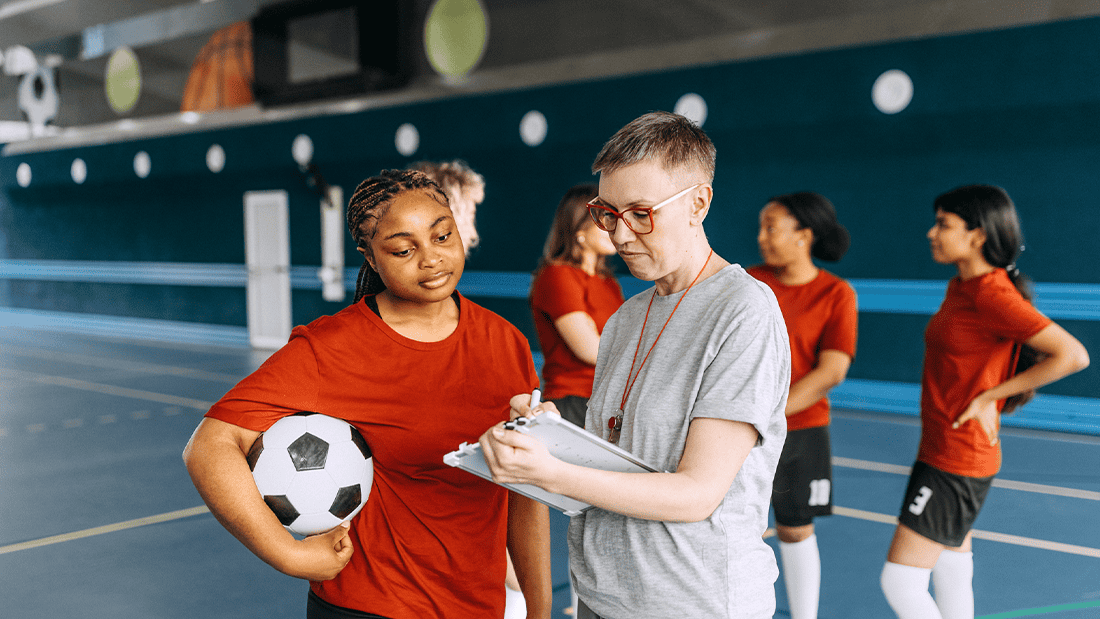How Sports Hydration Affects Your Performance
Let’s face it, sports hydration isn’t sexy. There’s nothing exciting about monitoring your hydration or drinking more water. However, if you skimp on H2O, you could be seriously limiting your athletic potential. Time to revisit a few aspects of the relationship between dehydration and performance that you might not recall.
Glycogen Stores
When you’re dehydrated, you use glycogen at a much faster rate. Glycogen is the form of carbohydrates stored in the muscles and liver. It’s the primary fuel source for activities requiring short bursts—between 30 seconds to 2 minutes. Glycogen is converted to ATP (fuel) through a process called glycolysis. Between these short bursts of activity, your body takes around 60 seconds to recover, making glycogen ideal for activities like strength training and high intensity interval training.
Glycogen is also used in combination with fat to fuel endurance activities. Although once it runs out of glycogen, the body can operate on fat stores alone, glycogen stores water, and when glycogen is depleted the body becomes further dehydrated.
RELATED: Hydration Facts Athletes Need to Know
Slowed Motor Neurons
Muscles don’t move without commands from the brain, sent through neural pathways. Without adequate hydration this process can become bogged down. What does this mean for you? Unless your motor neurons are firing on all cylinders, your strength, speed and vertical leap will be diminished.
Reduction in Blood Volume and Nutrient Delivery
Without proper hydration, your blood becomes thicker and cannot flow to and from the heart fast enough, causing a a reduction in maximal cardiac output. As a consequence, you will fatigue very quickly.
A reduction in body water and blood volume could also inhibit the delivery of nutrients to your muscles. Without nutrients like glucose and fatty acids during exercise, your muscles will fatigue even faster. This becomes an even bigger issue with respect to recovery. You begin rebuilding muscle tissue through a process called muscle protein synthesis, and this process requires amino acids from protein to be delivered to your muscles. Without proper hydration, your recovery could be seriously hindered.
Burn More Fat
Fat is a primary fuel source for lower-intensity and longer-duration activities. Without adequate cell hydration, the body is unable to oxidize fat as efficiently. A study in the European Journal of Clinical Nutrition showed that dehydration reduced fat oxidation and increased muscle protein breakdown. If you frequently perform low-intensity cardio, be sure to drink sufficient water to increase fat-burning potential.
More Stress
A study in the Journal of Applied Physiology found that dehydrated weightlifters produced more cortisol, a stress hormone (bad for performance and muscle), and less testosterone and other anabolic hormones. A side effect of elevated cortisol could be the sending of catabolic signals telling the body to break down muscle tissue for their amino acids to be used as fuel. Testosterone and growth hormone on the other hand, are potent muscle builders and markers of recovery.
RELATED: Hydrate With Food
As you can see, water intake plays a huge role in performance and muscle building. So how much should you be drinking? I don’t like blanket statements, because everyone is different. Some people sweat more than others, and some retain water more efficiently. Since there is no absolute recommendation on how much water to drink, you should look for a few signs to determine your hydration status.
One of the easiest ways to monitor your hydration is by paying attention to your urine color and frequency. When your body is properly hydrated, your urine will be clear, and you shouldn’t be able to go for hours without relieving your bladder. Darker, discolored urine and infrequent bathroom breaks indicate that you’re not drinking enough water.
RELATED: Hydrate With Pickle Juice for Cramps
Another thing to keep an eye on is water lost during exercise. This can be achieved by weighing yourself before and after activity. For recovery and other processes to begin, it’s important to replace the water you lost through perspiration and respiration during physical activity.
[cf]skyword_tracking_tag[/cf]RECOMMENDED FOR YOU
MOST POPULAR
How Sports Hydration Affects Your Performance
Let’s face it, sports hydration isn’t sexy. There’s nothing exciting about monitoring your hydration or drinking more water. However, if you skimp on H2O, you could be seriously limiting your athletic potential. Time to revisit a few aspects of the relationship between dehydration and performance that you might not recall.
Glycogen Stores
When you’re dehydrated, you use glycogen at a much faster rate. Glycogen is the form of carbohydrates stored in the muscles and liver. It’s the primary fuel source for activities requiring short bursts—between 30 seconds to 2 minutes. Glycogen is converted to ATP (fuel) through a process called glycolysis. Between these short bursts of activity, your body takes around 60 seconds to recover, making glycogen ideal for activities like strength training and high intensity interval training.
Glycogen is also used in combination with fat to fuel endurance activities. Although once it runs out of glycogen, the body can operate on fat stores alone, glycogen stores water, and when glycogen is depleted the body becomes further dehydrated.
RELATED: Hydration Facts Athletes Need to Know
Slowed Motor Neurons
Muscles don’t move without commands from the brain, sent through neural pathways. Without adequate hydration this process can become bogged down. What does this mean for you? Unless your motor neurons are firing on all cylinders, your strength, speed and vertical leap will be diminished.
Reduction in Blood Volume and Nutrient Delivery
Without proper hydration, your blood becomes thicker and cannot flow to and from the heart fast enough, causing a a reduction in maximal cardiac output. As a consequence, you will fatigue very quickly.
A reduction in body water and blood volume could also inhibit the delivery of nutrients to your muscles. Without nutrients like glucose and fatty acids during exercise, your muscles will fatigue even faster. This becomes an even bigger issue with respect to recovery. You begin rebuilding muscle tissue through a process called muscle protein synthesis, and this process requires amino acids from protein to be delivered to your muscles. Without proper hydration, your recovery could be seriously hindered.
Burn More Fat
Fat is a primary fuel source for lower-intensity and longer-duration activities. Without adequate cell hydration, the body is unable to oxidize fat as efficiently. A study in the European Journal of Clinical Nutrition showed that dehydration reduced fat oxidation and increased muscle protein breakdown. If you frequently perform low-intensity cardio, be sure to drink sufficient water to increase fat-burning potential.
More Stress
A study in the Journal of Applied Physiology found that dehydrated weightlifters produced more cortisol, a stress hormone (bad for performance and muscle), and less testosterone and other anabolic hormones. A side effect of elevated cortisol could be the sending of catabolic signals telling the body to break down muscle tissue for their amino acids to be used as fuel. Testosterone and growth hormone on the other hand, are potent muscle builders and markers of recovery.
RELATED: Hydrate With Food
As you can see, water intake plays a huge role in performance and muscle building. So how much should you be drinking? I don’t like blanket statements, because everyone is different. Some people sweat more than others, and some retain water more efficiently. Since there is no absolute recommendation on how much water to drink, you should look for a few signs to determine your hydration status.
One of the easiest ways to monitor your hydration is by paying attention to your urine color and frequency. When your body is properly hydrated, your urine will be clear, and you shouldn’t be able to go for hours without relieving your bladder. Darker, discolored urine and infrequent bathroom breaks indicate that you’re not drinking enough water.
RELATED: Hydrate With Pickle Juice for Cramps
Another thing to keep an eye on is water lost during exercise. This can be achieved by weighing yourself before and after activity. For recovery and other processes to begin, it’s important to replace the water you lost through perspiration and respiration during physical activity.















